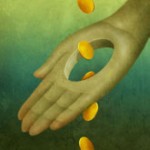Is the Worst Over?
It would be too much to say that champagne corks were popping on Wall Street last week, but there was an almost audible sigh of relief wafting through the
Jul 31, 2020151.8K Shares2M Views
It would be too much to say that champagne corks were popping on Wall Street last week, but there was an almost audible sigh of relief wafting through the trading rooms. While almost no one was prepared to say that the credit crunch was over, there was a palpable sense that the violent market turmoil of the past year might finally be coming to an end.
There was plenty to be happy about. The dazzling financial pyrotechnics at the Federal Reserve over the past several weeks did indeed seem to ease some of the tensions in credit markets. Though bank first-quarter announcements are the usual dismal litany of losses and write-offs, some of the most beleaguered, like UBS, Washington Mutual and the Royal Bank of Scotland, still seem able to raise new capital. First quarter earnings at big industrial companies like [IBM](http://www.ibm.com/investor/1q08/1q08earnings.phtml Goodyear http://www.goodyear.com/investor/pdf/BCL31157BCL002.pdf) (pdf), and General Electric– if one ignores the results of GE’s financial businesses – were actually quite decent.
Illustration by: Matt Mahurin
So is the worst over? Not by a long shot. We still have a long way to go.
A single number tells most of the story. Between 2000 and 2007, Americans withdrew $4.2 trillion in free cash flow from their homes – in other words, $4.2 trillion in new mortgage debt that was not invested in new housing or in paying down old mortgages. Instead, it was spent on other stuff, like new cars and plasma TVs. For the three years through 2006, the free cash flow from mortgages was more than 7 percent of disposable personal income. That’s why personal consumption could break all records at a time when real wages were falling.
But when house prices suddenly tipped into free-fall in mid-2007, home mortgage financing dried up. By the end of the year, mortgage finance flows were about half the average for the previous several years. Pathetically, credit card borrowing jumped to an all-time high in the third quarter of 2007, but dropped right back by year end, as card companies quickly tightened the screws.
In the last half of 2007, households also began a major sell-off of financial assets, like stocks and bonds. Much of that must have come from already-paltry retirement savings.
Now, take a closer look at those good results from the big industrial stocks. These are global companies. They sell all around the world, and they have learned the advantage of locating their factories, research labs and employment centers where they sell. Uniformly, revenue and profits in the United States for IBM, GE, and Goodyear have either fallen or slowed sharply. Americans benefit when American company stock prices go up, of course, but the immediately tangible payoffs – rising employment, more plant investment – will go where the sales are. Right now, America’s not where the growth is.
Mohammed El-Erian, the co-chief executive at PIMCO, a large global bond manager, recently observed that almost all the market disruptions from the credit crunch have transpired while the economy was still growing. What’s happened so far, in other words, is just prologue for when recession really bites.
House prices fell about 10 percent last year. A growing number of analysts expect another 15 percent – 20 percent price drop will be necessary to bring housing costs back in line with incomes. Some 8 million homeowners are stuck with mortgages worth more than the their homes’ market value, even as consumers are increasingly squeezed by flat wages, soft employment and back-breaking price increases for gasoline and food.
What’s happened so far, in other words, is just prologue for when recession really bites.
The New York Times recently documented sharp drops in consumer spending on women’s clothing, furniture, luxury goods and airline travel, as well as a pronounced shift to lower-cost, non-branded basics from pizzas to beer. But surveys adduce plenty of evidence that consumers are still stretching to maintain spending in high-tension items — like the video game that your kid really, really wants. In other words, recession is taking hold, but we haven’t yet adjusted to the reality.
And, regretfully, the banking crisis is far from over. Last week, the ratings agencies downgraded thousands more mortgage-backed bonds, and there are thousands yet to go. At best, only about half the mortgage-related problems are behind us. Many of the highly leveraged private equity companies taken over in the recent buyout splurge are very exposed to the consumer sector, and their debt is weighing heavily on many banks.
Smaller, regional banks may be about to join the party. Though they generally are not exposed to the kind of toxic instruments that brought Citigroup and Merrill Lynch low, they still have heavy straight real estate exposure, and are sure to start taking losses.
At this point, the Fed is finally running out of magic tricks. Banks know they are facing future losses, and are pulling in credit lines, hoarding capital for the crises on the horizon. More rate cuts by the Fed risks losing control over inflation.
For some 15 years, wise people have been nattering about America’s profligate spending and low savings. We all knew they were right. This time, winter is really coming.
America is a resilient country, and we will get through it. But the notion that we’ve paid our dues, and that good times are just over the next hill, is a dangerous hallucination.
*Charles R. Morris, a lawyer and former banker, is the author of **“The Trillion Dollar Meltdown: Easy Money, High Rollers and the Great Credit Crash.” ***His other books include ***“The Tycoons: How Andrew Carnegie, John D. Rockefeller, Jay Gould and J.P. Morgan Invented the American Supereconomy” *and “Money, Greed, and Risk: Why Financial Crises and Crashes Happen.”

Rhyley Carney
Reviewer
Latest Articles
Popular Articles
